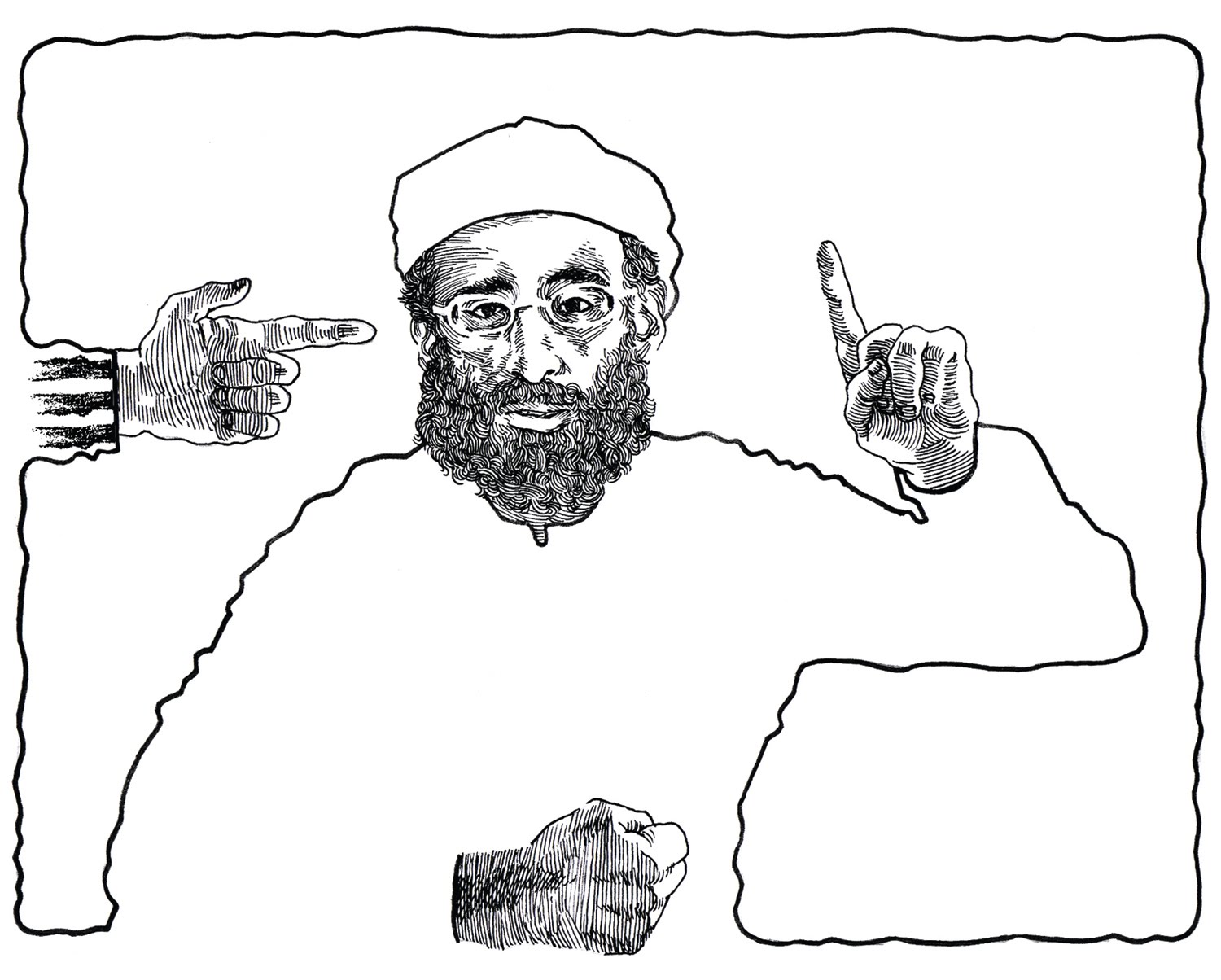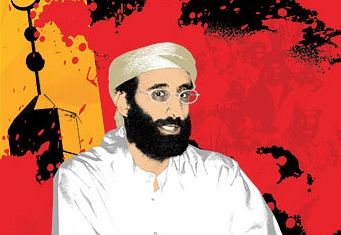
NEW YORKER: Anwar al-Awlaki is dead, according to Administration officials. Does everyone feel safer? There are benefits, of course, to not having someone on the streets or hills of Yemen who wants to kill his fellow Americans—and Awlaki was an American, born in New Mexico. He was killed in a drone strike to his convoy, in an operation run by the C.I.A. and the Joint Special Operations Command. But there are a couple of points here that should make anyone wary: first, that the President of the United States could order the killing of an American citizen with no judicial proceedings, in a country (Yemen) with which we are not at war, simply because the President judges that person to be dangerous; and, second, the fuzziness used when discussing the exact nature of the danger Awlaki posed. […] When one hears about Awlaki being linked to a dozen terror cases, the link in question is more often a sermon or an article or e-mails about jihad, rather than what might be called overt acts. (The Washington Post noted that he had been “been implicated in helping to motivate several attacks on U.S. soil.”) Would that have been enough? This is not to underplay the  hatred present in Awlaki’s words. But a bad man can inspire not only bad acts on the part of his followers but the embrace of a bad precedent by his enemies. (That’s us.) Reading about Awlaki—even approving of his death—one shouldn’t shut out the truth that one gets in murky territory when talking about the danger of someone’s words. Can the same logic be extended to a novelist who pops up on the reading list in some mass shooter’s online manifesto? When can a writer or a preacher—including one who claims, however genuinely, to have never intended for anyone to get hurt—be blamed when someone is? There may be enough in the Awlaki case to answer that question adequately. But it must be asked, in more than a perfunctory way, because it is hard to see what, in the Administration’s rationale, would prevent shooting an American dead in London without bothering with a trial. (And if the answer is that Awlaki had a funny name and didn’t dress like most Americans do—well, that suggests other, dangerous questions about who we think we are as a country.) MORE
hatred present in Awlaki’s words. But a bad man can inspire not only bad acts on the part of his followers but the embrace of a bad precedent by his enemies. (That’s us.) Reading about Awlaki—even approving of his death—one shouldn’t shut out the truth that one gets in murky territory when talking about the danger of someone’s words. Can the same logic be extended to a novelist who pops up on the reading list in some mass shooter’s online manifesto? When can a writer or a preacher—including one who claims, however genuinely, to have never intended for anyone to get hurt—be blamed when someone is? There may be enough in the Awlaki case to answer that question adequately. But it must be asked, in more than a perfunctory way, because it is hard to see what, in the Administration’s rationale, would prevent shooting an American dead in London without bothering with a trial. (And if the answer is that Awlaki had a funny name and didn’t dress like most Americans do—well, that suggests other, dangerous questions about who we think we are as a country.) MORE
WASHINGTON POST: U.S. officials also disclosed what they said were new details about Aulaqi’s operational role, saying that he personally had instructed a would-be suicide bomber who boarded a Detroit-bound plane in 2009 to detonate his device over American airspace to maximize casualties. When he first surfaced on U.S. counterterrorism radar, Aulaqi was mainly seen as a militant cleric, a native of New Mexico who was acquiring a disturbingly large audience for his English-language sermons online. More recently, he was portrayed as an increasingly operational figure for al-Qaeda in the Arabian Peninsula, as the Yemen-based off-shoot is known. But on Friday, U.S. officials including National Security Council spokesman Tommy Vietor described Aulaqi as  “chief of external operations.” A U.S. intelligence official said that CIA analysts and others had been referring to Aulaqi by that designation for some time, saying that he was “intimately involved in the attacks that have come closest to hitting the United States.” Umar Farouk AbdulmutallabIn December 2009, Aulaqi “specifically instructed” Umar Farouk Abdulmutallab to wait until his Christmas Day flight had crossed into U.S. airspace before detonating the bomb he had hidden in his underwear, an Obama administration official said. MORE
“chief of external operations.” A U.S. intelligence official said that CIA analysts and others had been referring to Aulaqi by that designation for some time, saying that he was “intimately involved in the attacks that have come closest to hitting the United States.” Umar Farouk AbdulmutallabIn December 2009, Aulaqi “specifically instructed” Umar Farouk Abdulmutallab to wait until his Christmas Day flight had crossed into U.S. airspace before detonating the bomb he had hidden in his underwear, an Obama administration official said. MORE
WIKIPEDIA: Anwar al-Awlaki (also spelled Aulaqi; Arabic: ???? ???????? Anwar al-‘Awlaq?; April 22, 1971 – September 30, 2011)[4][10] was an Islamic lecturer and spiritual leader who was an engineer and educator by training.[11][12] Of Yemeni descent, he had dual United States and Yemeni citzenship.[13] According to U.S. officials, he was a senior talent recruiter and motivator who had become “operational” as a planner and trainer for the Islamist militant group al-Qaeda.[3][8][14][15][16][17] He was implicated in helping to motivate at least three attacks on U.S. soil,[18] and was the first U.S. citizen to be approved for targeted killing.[19][20][21] With a blog, a Facebook page, and many YouTube videos, he had been described as the “bin Laden of the Internet”.[22][23]
Al-Awlaki reportedly spoke with, trained, and preached to a number of al-Qaeda members and affiliates, including three of the 9/11 hijackers,[24] alleged Fort Hood shooter Nidal Malik Hasan,[25][26] and alleged “Christmas Day bomber” Umar Farouk Abdulmutallab;[27][28][29] he was also reportedly involved in planning the latter’s attack.
According to U.S. officials, al-Awlaki was promoted to the rank of “regional commander” within al-Qaeda in 2009.[5][30] Like other members of the group, he repeatedly called upon Muslims to commit jihad against the United States.[31][32][33] In April 2010, U.S.  President Barack Obama approved Al-Awlaki’s targeted killing, a first for an American citizen,[19][20][21] and a move unsuccessfully challenged by al-Awlaki’s father and the American Civil Liberties Union (ACLU).[34]
President Barack Obama approved Al-Awlaki’s targeted killing, a first for an American citizen,[19][20][21] and a move unsuccessfully challenged by al-Awlaki’s father and the American Civil Liberties Union (ACLU).[34]
Al-Awlaki was believed to be in hiding in Southeast Yemen in the last years of his life.[35] The Yemenese government began trying him in absentia in November 2010, for plotting to kill foreigners and being a member of al-Qaeda, and a Yemeni judge ordered that he be captured “dead or alive”.[35][36] U.S. unmanned drones were deployed in Yemen to search for and kill him,[37] firing at and failing to kill him at least once,[38] before killing him in a drone attack in Yemen on September 30, 2011.[10] MORE
